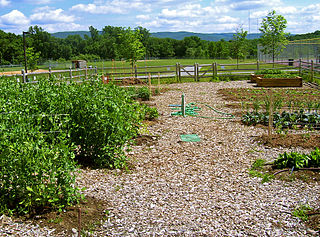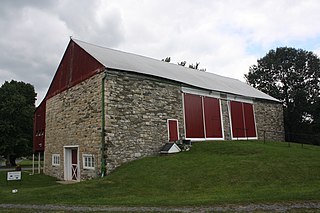Related Research Articles

Organic farming, also known as ecological farming or biological farming, is an agricultural system that uses fertilizers of organic origin such as compost manure, green manure, and bone meal and places emphasis on techniques such as crop rotation and companion planting. It originated early in the 20th century in reaction to rapidly changing farming practices. Certified organic agriculture accounts for 70 million hectares globally, with over half of that total in Australia. Organic farming continues to be developed by various organizations today. Biological pest control, mixed cropping, and the fostering of insect predators are encouraged. Organic standards are designed to allow the use of naturally-occurring substances while prohibiting or strictly limiting synthetic substances. For instance, naturally-occurring pesticides such as pyrethrin are permitted, while synthetic fertilizers and pesticides are generally prohibited. Synthetic substances that are allowed include, for example, copper sulfate, elemental sulfur, and ivermectin. Genetically modified organisms, nanomaterials, human sewage sludge, plant growth regulators, hormones, and antibiotic use in livestock husbandry are prohibited. Organic farming advocates claim advantages in sustainability, openness, self-sufficiency, autonomy and independence, health, food security, and food safety.

The following outline is provided as an overview of and topical guide to organic gardening and farming:

Community-supported agriculture or cropsharing is a system that connects producers and consumers within the food system closer by allowing the consumer to subscribe to the harvest of a certain farm or group of farms. It is an alternative socioeconomic model of agriculture and food distribution that allows the producer and consumer to share the risks of farming. The model is a subcategory of civic agriculture that has an overarching goal of strengthening a sense of community through local markets.
Eliot Coleman is an American farmer, author, agricultural researcher and educator, and proponent of organic farming. He wrote The New Organic Grower. He served for two years as Executive Director of the International Federation of Organic Agriculture Movements (IFOAM), and was an advisor to the U.S. Department of Agriculture during its 1979–80 study, Report and Recommendations on Organic Farming, a document that formed the basis for today's legislated National Organic Program (2002) in the U.S.

A market garden is the relatively small-scale production of fruits, vegetables and flowers as cash crops, frequently sold directly to consumers and restaurants. The diversity of crops grown on a small area of land, typically from under 0.40 hectares to some hectares, or sometimes in greenhouses, distinguishes it from other types of farming. A market garden is sometimes called a truck farm.

Organic horticulture is the science and art of growing fruits, vegetables, flowers, or ornamental plants by following the essential principles of organic agriculture in soil building and conservation, pest management, and heirloom variety preservation.

Angelic Organics, located in Caledonia, Illinois, is one of the oldest Community Supported Agriculture (CSA) farms in the United States. Angelic Organics has grown produce in accordance with organic and biodynamic principles since 1990. Participating subscribers, known as shareholders, receive a weekly 3/4 bushel box of fresh vegetables and herbs delivered to over 40 Chicago area sites.

The Food Project is a non-profit organization that employs teenagers on farms in Lincoln, Roxbury and the North Shore of Massachusetts. It focuses on community improvement and outreach, and education about health, leadership, charity, and sustainable agriculture. The youth are recruited from urban areas of Boston, Lynn, and surrounding suburbs to plant and harvest crops for sale at Farmers' Markets and CSAs, and donation to local hunger-relief organizations and homeless shelters. The program emphasizes community building and fosters good work ethic, providing a good foundation for future employment.
Booker T. Whatley was an agriculture professor at Tuskegee University, Alabama, and a pioneer of sustainable agriculture in the post-World War II era. He also aimed to "generate an agrarian black middle class".
Development-supported agriculture is a nascent movement in real estate development that preserves and invests in agricultural land use. As farmland is lost due to the challenging economics of farming and the pressures of the real estate industry, DSA attempts to reconcile the need for development with the need to preserve agricultural land. The overall goal of DSA is to incubate small-scale organic farms that co-exist with residential land development, providing benefits to farmers, residents, the local community, and the environment.

Rodale Institute is a non-profit organization that supports research into organic farming. It was founded in Emmaus, Pennsylvania in 1947 by J. I. Rodale, an organic living entrepreneur. After J.I. Rodale died in 1971, his son Robert Rodale purchased 333 acres and moved the farm to Kutztown, Pennsylvania.
Robyn Van En was an American organic farmer and pioneer of the Community Supported Agriculture (CSA) movement.

Marin Organic is a non-profit 501(c)(3) association of organic producers headquartered in Point Reyes Station, California. Founded in 1999 with the goal of creating the first all-organic county, Marin Organic is known for working with the government, community groups and organizations, fellow ranchers and farmers to advance the practice of sustainable, organic production. The organization is internationally recognized model for building economically viable, community-based local foodsheds.
Green String Farm is a 140-acre (57 ha) natural process, sustainable farm near Petaluma, California that grows fruits and vegetables year-round and sells them in an on-site farm store that is open to the public seven days a week. In addition to produce, the farm also supplies free-range eggs and grass fed beef to regional restaurants including the famed Chez Panisse in Berkeley, CA. Bob Cannard and Fred Cline founded Green String Farm and the Green String method of sustainable farming in 2003. The Green String method meets the highest standard of environmental sustainability practices, which is different from Certified Organic.
The Duchy Home Farm is an organic farm operated by the Duchy of Cornwall. The farm is part of the gardens of Highgrove House, the country home of King Charles III. The produce is used as ingredients in Duchy Originals products, sold in vegetable boxes, and wholesaled to supermarkets and restaurants. King Charles is credited with using "pioneering agriculture techniques" to produce this organic food.

The Glynwood Center for Regional Food and Farming, also known as Glynwood, is a nonprofit organization in Cold Spring, New York. Its mission is to help save farming in the Northeast, particularly the Hudson Valley, by strengthening farm communities and regional food systems. Located in the Hudson Valley, the Glynwood Center strives to get small- and mid-sized farmers to thrive, "on the land and in the marketplace".

Regenerative agriculture is a conservation and rehabilitation approach to food and farming systems. It focuses on topsoil regeneration, increasing biodiversity, improving the water cycle, enhancing ecosystem services, supporting biosequestration, increasing resilience to climate change, and strengthening the health and vitality of farm soil.

Jean-Martin Fortier is a Québécois farmer, author, educator and advocate for ecological, human-scale and economically-viable sustainable agriculture.
Shi Yan is a farmer and founder of the first Community Supported Agriculture (CSA) farm in China.
Will Bonsall is an American author, seed saver and veganic farmer who lives in Maine. He is a regular speaker about seed saving, organic farming and veganic farming.
References
- ↑ Sayre, Laura. "Farming for Credit". Rodale Institute. Retrieved July 1, 2010.
- ↑ Schoen, Heather (February 16, 2002). "Case Study: Common Ground Student-run Educational Farm" (PDF). University of Vermont. Retrieved July 1, 2010.
- ↑ Ferrarese, Michelle (August 2005). "It Takes a Village to Raise A Salad: The Development of the Student Organic Farm and Community Supported Agriculture Program at Michigan State University" (PDF). Michigan State University. Retrieved July 1, 2010.
- ↑ Agenbroad, Ariel Lynne (May 2007). "Sustainable Vegetable Production Planning for Direct Markets: Lessons from a Student Organic Farm on the Palouse" (PDF). University of Idaho in Moscow. Archived from the original (PDF) on June 13, 2010. Retrieved July 1, 2010.
- ↑ Sayre, Laura. "Farming for Credit". Rodale Institute. Retrieved July 1, 2010.
- ↑ Sayre, Laura. "Farming for Credit". Rodale Institute. Retrieved July 1, 2010.
- ↑ Szewczyk, Stacey (April 14, 2010). "Hungry for Change". Central PA Magazine. WITF. Archived from the original on July 7, 2010. Retrieved July 1, 2010.